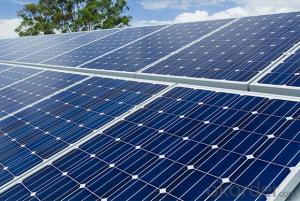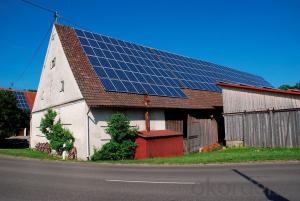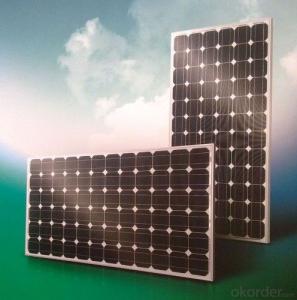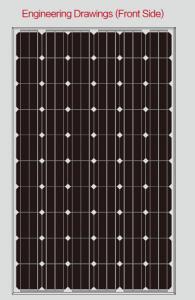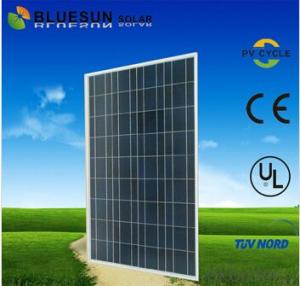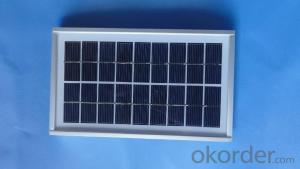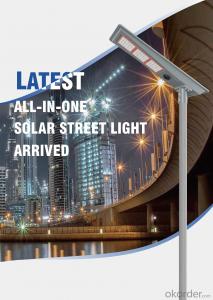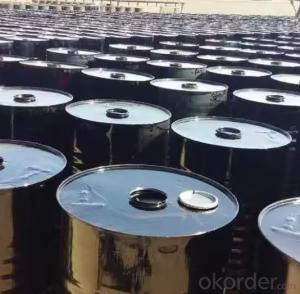CNBM Solar Monocrystalline 125mm Series (60W—65W)
- Loading Port:
- China main port
- Payment Terms:
- TT OR LC
- Min Order Qty:
- 100000 watt
- Supply Capability:
- 10000000 watt/month
OKorder Service Pledge
OKorder Financial Service
You Might Also Like
About us
CNBM International Corp, established in 2004, is the business entity for trade and logistic of CNBM Group.With the advantages in Cement, Composite Materials, New Building Materials and Engineering, CNBM mainly concentrate on coal, steel and construction equipments and give priority to solar and wind energy development.CNBM International is highly recognized by its business partners and clients all over the world and has established good business relationship with the customers in over 120 countries and regions all over the world.
Wiring
To ensure proper system operation to maintain your warranty, observe the correct cable connection polarity(Figures 1&2) when connecting the modules to a battery or to other modules. If not connected correctly, the bypass diode could be destroyed.
PV modules can be wired in series to increase voltage. Connect wires from the positive terminal of one module to the negative of the next module. Figure shows modules connected in series .
Work Principle
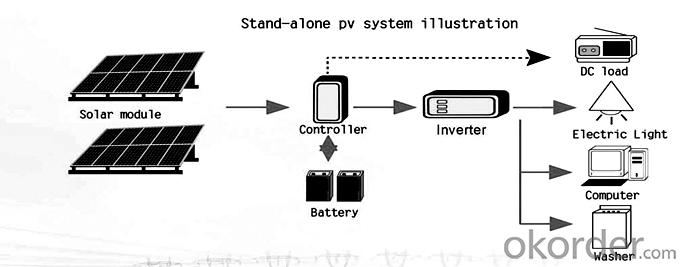
Data sheet
| Characteristics | |
| Max Power Voltage Vmp (V) | 17.4V-17.6W |
| Max Power Current Imp (A) | 3.61A-3.88A |
| Open Circuit Voltage Voc (V) | 22.3V-22.4V |
| Short Circuit Current Isc (A) | 3.45A-3.69A |
| Max Power Pm (W) | 60W-65W |
| Temperature Coefficient of Cells | |
| NOCT | 47℃±2℃ |
| Temperature Coefficients of Isc (%/℃) | 0.06% |
| Temperature Coefficients of Voc (%/℃) | -0.32% |
| Temperature Coefficients of Pmp (%/℃) | -0.45% |
| Mechanical Data | |
| Type of Cells (mm) | Mono125×41.7 |
| Dimension | 820×550×30mm |
| Weight | 5.6kg |
| NO.of Cells and Connections | 4×9=36/4×18=72 |
| Limits | |
| Operating Temperature | –45°C to +80°C |
| Storage Temperature | –45°C to +80°C |
| Max System Voltage | 700V |
FAQ:
Q1: Why buy Materials & Equipment from OKorder.com?
A: All products offered byOKorder.com are carefully selected from China's most reliable manufacturing enterprises. Through its ISO certifications, OKorder.com adheres to the highest standards and a commitment to supply chain safety and customer satisfaction.
Q2: What is a solar PV module?
A: A solar PV module consists of many solar cells that are connected together (typically in series) and packaged in a frame (typically made of aluminum).
Q3: What are the advantages and disadvantages of monocrystalline solar PV modules?
A: Monocrystalline solar PV modules are the most efficient type of solar PV modules, with the exception of CdTe thin film solar PV modules. As a result, monocrystalline solar PV modules are more expensive when compared to almost all other types of solar PV modules.
Q4: What is the typical service life of a solar PV module?
A: The typical life of a PV module is 25 years. However, superior quality PV modules boast service lives up to 35-40 years (electrical generating capacity is often reduced, however by that point).
Q5: What certifications do you have?
A: We are specialized in the photovoltaic field, with a focus on solar cells, modules and photovoltaic power generation systems. We employ advanced monocrystalline and polycrystalline silicon solar cell manufacturing equipment, producing highly efficient and reliable products sold in Europe, the Americas and Australia. Our company has passed ISO9001 quality management system certification, and our products have obtained TUV-IEC, CE and ISO certification.
- Q:I want to know how to hook up a Solartech SPM020P-R, 20W Solar Panel to a single outlet that you can but at a store.
- That panel you reference puts out about 20W. @ 8V of DC. You can't wire that to a standard 20V outlet without a battery/inverter unit. Even then, you don't get a useful amount of power. In a full day you would collect enough energy to run a small TV for about an hour.
- Q:Can solar panels be installed on a data storage facility or server farm?
- Yes, solar panels can be installed on a data storage facility or server farm. It is a viable option to harness renewable energy and reduce the carbon footprint of these energy-intensive operations.
- Q:I have two solar panels that were going to be trashed at work. I want to use them to charge batteries on my RV but i noticed they put out around 20 volts in direct sunlight. So i am wondering: -isn't this way too much voltage for a 2 volt system? -do a need some sort of a regulator connected to keep them from overcharging?
- 20 volts is a common open-circuit voltage for nominal 2v panels. The panels put out about 5v at full load. If the panel puts out little enough that it takes 20 hours or more to put a full charge in the battery you can get by without a charge controller - just keep the cells topped up with distilled water. A charge controller will do a more efficient job, though. The most efficient charge controllers use what's called Maximum Power Point Technology (MPPT) which lets the panels operate at their most efficient point throughout the battery's charging cycle. Available on OKorder. The charge controller should have the same or higher wattage as the panels it controls - if you're not sure of wattage, assume that they are the same as similar area panels you find for sale. Before buying a charge controller, connect the panels through an ammeter to a discharged battery. They may have been trashed because of damage and low output. You need at least an amp for trickle charge, 5 amps for reasonable recharge times.
- Q:Are solar panels affected by shade?
- Yes, solar panels are affected by shade. Shading can significantly reduce the efficiency and overall energy production of solar panels. It is important to ensure that solar panels are installed in areas with minimal shade to maximize their performance.
- Q:I'm looking for some advice on hot water solar panels. I'm trying to save some money on electricity. A neighbor has been suggesting solar powered equipment for some time now, and I think he's right. It does save quite a bit of money in the long run. They're kind of expensive though, so I'm looking for cheaper alternatives.
- If you are just looking for hot water, you can build your own water pre-heater with copper tubing, mirrors, black engine paint, wood for an enclosure, and glass to cover the enclosure. I have seen plans online but cannot recall just now where. I've included some links below that you might want to check out. Also, you may want to check on tax rebates in your area for using solar. In some areas you can get rebates to pay nearly 00% of the cost. Or search for how to build a solar water heater for a LOT of online sites. One caution, do NOT use water directly from a solar water heater as it can be hot enough to burn your skin.
- Q:I am doing a science fair project on solar panels, and I need four solar panels to conduct the experiment. I would only need the solar panels for a week. What type of solar panel should I get?
- If okorder / for some ideas.
- Q:Are solar panels fire hazards?
- Solar panels are generally not considered fire hazards. While there have been some isolated incidents of fires related to solar panels, they are extremely rare and typically caused by faulty installations, damaged equipment, or external factors. When installed properly and maintained regularly, solar panels pose no significant fire risk.
- Q:Are there any fire hazards associated with solar panels?
- Yes, there are potential fire hazards associated with solar panels. Although solar panels themselves do not typically catch fire, electrical malfunctions or faults in the wiring, inverters, or connectors can lead to overheating and fire. Additionally, if a fire breaks out in the surrounding area, solar panels can hinder firefighting efforts by creating potential electrical hazards and obstructing access to the roof. Therefore, proper installation, regular maintenance, and compliance with fire safety regulations are crucial in mitigating these risks and ensuring the safe operation of solar panel systems.
- Q:What is the typical warranty period for solar panels?
- The typical warranty period for solar panels ranges from 20 to 25 years.
1. Manufacturer Overview |
|
|---|---|
| Location | |
| Year Established | |
| Annual Output Value | |
| Main Markets | |
| Company Certifications | |
2. Manufacturer Certificates |
|
|---|---|
| a) Certification Name | |
| Range | |
| Reference | |
| Validity Period | |
3. Manufacturer Capability |
|
|---|---|
| a)Trade Capacity | |
| Nearest Port | |
| Export Percentage | |
| No.of Employees in Trade Department | |
| Language Spoken: | |
| b)Factory Information | |
| Factory Size: | |
| No. of Production Lines | |
| Contract Manufacturing | |
| Product Price Range | |
Send your message to us
CNBM Solar Monocrystalline 125mm Series (60W—65W)
- Loading Port:
- China main port
- Payment Terms:
- TT OR LC
- Min Order Qty:
- 100000 watt
- Supply Capability:
- 10000000 watt/month
OKorder Service Pledge
OKorder Financial Service
Similar products
New products
Hot products
